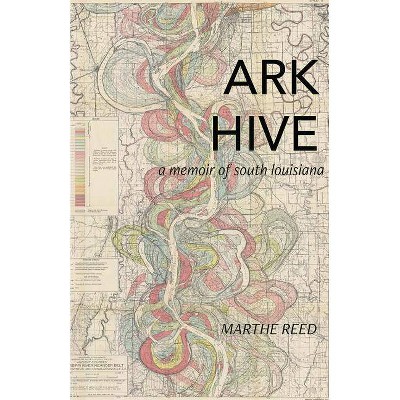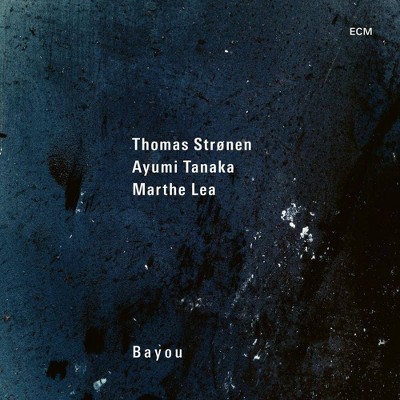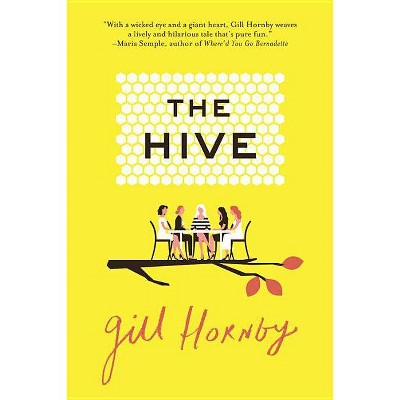Ark Hive - by Marthe Reed (Paperback)

Similar Products
Products of same category from the store
AllProduct info
<p/><br></br><p><b> About the Book </b></p></br></br>Exploring a tangled, unsettled love for place amid the landscape, cultures, and social and ecological crises of South Louisiana, ARK HIVE seeks amid the ruins for answers-what does it mean to be here, now? Marthe Reed's ecological long poem is a documentary poetics that subverts its own monumentality through the interrogation of place.<p/><br></br><p><b> Book Synopsis </b></p></br></br><p>Exploring a tangled, unsettled love for place amid the landscape, cultures, and social and ecological crises of South Louisiana, <em>ARK HIVE</em> seeks amid the ruins for answers--what does it mean to be here, now? Following the ley-lines carved out in the streets and bayous of a rapidly eroding landscape, this collection refuses stability, confident of only the riddle and the manifold voices activating it. Reed's formal hybridity juxtaposes hand-made maps, collaged language, and altered documents with lyrics and lyric essays: "fragments [from] journals, photographs, memory, archives--time capsule of a disintegrating world." <em>ARK HIVE</em> bears its loves and dead along the current of the work's own profligate vegetative urge--accretions of history and immersion, saturations of grief and delight. Tender and monumental, a teeming hive of voices, <em>ARK HIVE</em> returns an extraordinary, vanishing world to the center of our attention.</p><p>"There are locations--like Hawai'i, like Louisiana--where cultures are unique to the place, and outsiders are made to know themselves from insiders. As a poet familiar with issues of appropriation and theft, Marthe Reed asked herself how a Californian who had lived in Providence and Perth, could write about Louisiana, a place she loved over her many years of living in Lafayette. "Writing Louisiana, outsider-inside, poles of affection and alienation push and pull against me." Her answer was to piece together an archive, and to write an epic from its documents: photographs, maps, names of birds, travel journals, histories, languages. What ultimately brings this material to life are the heart-lyrics stitched through the whole: from "threnody" "I keep the contents of my heart / stacked in wet clay / heavy with downpour," where "behind the grate the small / eyes of an armadillo / muted reek / of urine and feces[.]" The threnody she wrote was for a beautiful, fraught, and fragile place. It grieves me to write my paragraph in the past tense. Shortly before she died she told me, "We're all going to die and no one will remember us; it's ok." We are here to remember her and this ravishing, important, necessary work." --Susan M. Schultz</p><p><br /> <br /> </p><p/><br></br><p><b> Review Quotes </b></p></br></br><br><p>"Marthe Reed's ecological long poem <em>Ark Hive</em> is a tour de force, a towering work in the field of documentary poetics that both sounds the alarm with sonic brilliance and subverts its own monumentality through the interrogation of place. <em>Ark Hive</em> enacts on a formal level the trembling prairie of South Louisiana and so unfolds in a constant state of oscillation: between prose and poetry, fact and uncertainty, the lyric and the visual, English and French, French and Atakapa-Ishak, and, most of all, between celebration of and elegy for the "green bottomland forest, green coastal seas, green marsh grass--prairie tremblant--shifting in the wet." In an extraordinary and personal meditation on one of the most fractured and ecologically vulnerable regions in the known world, Reed writes as an insider-outsider of the umwelt where she lived for eleven years: "Here and not here, what to make of this place called home?" Through arduous research, oral histories, and even hand-drawn maps, <em>Ark Hive</em> leaves prairie-wide space for the reader to truly consider and understand the impact of racism, corporate malfeasance, and the widening delta of chemical spills on this place and the people who live here. <em>Ark Hive</em> asks us whether we can survive ourselves--our flooding, our oil industry--and if a new sociality, a new way of being withothers, as encapsulated by this book, may help ensure the survival of species, ourselves included." - Henk Rossouw<br /> <br /> "Here. Now. Live. Marthe Reed's intimate engagement with South Louisiana will moor you to wherever you find yourself. An "act of memory and affection," <em>ARK HIVE</em> teaches us how to attend to place. "Following the ley-lines carved out in the streets and bayous of a rapidly eroding landscape, this collection refuses stability, confident of the only riddle and the manifold voices activating it." Reed's hive is a choral fugue of over 85 voices: jazz legends, FEMA officials, fishermen, botanists, bakers, executives, imprisoned citizens, literary icons--neighbors all--knit multiple languages into an exquisite sampler of contemporary poetics. Lush with flora, hand-made maps, collaged language and altered documents sing resiliency; this "palimpsest of deluge and silt" flourishes amid debacles--Katrina, BP oil spill, and Texas Brine. A spine of questions borrowed from Bhanu Kapil (the how-what-when of bodily love-n-fear) sutures readers into Reed's tender, monumental dance: "the band is already playing step, slow-quick, quick." Mesmerizing. It is as if she never left Louisiana, as if she never left us."--Lori Anderson Moseman</p><p> </p><p><br /> </p><p><br /> </p><br>
Price History
Price Archive shows prices from various stores, lets you see history and find the cheapest. There is no actual sale on the website. For all support, inquiry and suggestion messagescommunication@pricearchive.us



















